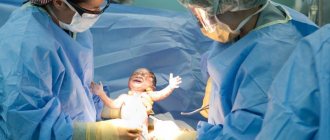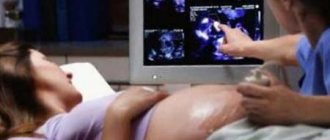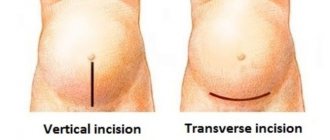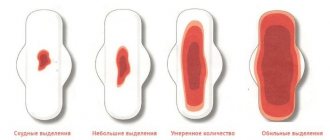Caesarean section: from preparation for surgery to discharge from the hospital
What is a planned caesarean section? This is a surgical procedure to remove the baby through an incision in the uterus due to the inability to give birth on your own. The woman in labor is examined and goes to the maternity ward in advance.
The doctor who will guide you throughout your pregnancy will tell you how to prepare for a caesarean section.
As a rule, the operation is scheduled for 40 weeks. During this period, the fetus gains sufficient weight and begins to breathe.
If a cesarean section is performed a second time, it is scheduled a little earlier to prevent contractions. Then there will be no complications during the operation.
A woman does not have to go to the hospital in advance. She can wait at home for the due date if she and the child do not have any negative indications.
When a caesarean section is performed, an unforeseen situation may occur and blood may be needed, so before the operation the woman donates plasma. In addition, all necessary tests are performed.
You cannot eat or drink directly on the day of the event. You need to do an enema and install a catheter in the ureter.
The operation cannot be performed without anesthesia. The woman in labor is offered two options for anesthesia: general and epidural, when she can see and hear the birth of the baby.
How long a caesarean section lasts depends on the woman’s condition and the method of operation.
Most often, a transverse incision is made on the abdominal wall and uterus. This method allows the operation to be performed much faster, and the patient will lose less blood.
The scar is effectively tightened, becomes rich and looks aesthetically pleasing.
If there are no complications, the woman is discharged on the 4th day after surgery.
At home, she should observe and care for her stitch. Maintain simple body hygiene.
If suppuration occurs, pain and other unpleasant sensations bother you, it is better to immediately contact the clinic.
Caesarean section in Kyiv
Any maternity hospital in Ukraine will ask you to make a charitable contribution
.
The amount is not approved by any regulatory document, so the amount is different in each maternity hospital. A caesarean section with registration, in addition to the fee, will cost the purchase of a package of medicines ( 1000-2000 hryvnia
).
It is believed that Maternity Hospital No. 5 in Kyiv specializes in delivery by cesarean section, so all doctors are first-class specialists. It is possible to conclude a contract for childbirth with the team on duty or with a specific doctor. The second option is a little more expensive.
At the beginning of 2020, a standard package with an on-duty team cost about 8 thousand hryvnia, and with your doctor - 14 thousand hryvnia. Those. on average the amount was about 1 thousand.e.
If you choose the all-inclusive package, the costs will double, but you will get a private room, possibly with room sharing.
For a caesarean section with a personal doctor and a separate room, you will pay 24 thousand hryvnia.
Already in September 2020, “luxury” options increased. An operation and ordinary apartments with a team on duty under a contract will amount to 18.6 thousand hryvnia, with a personal doctor 25.3 thousand hryvnia. If luxury apartments for postpartum stay - 24.4 thousand hryvnia and 31 thousand hryvnia, respectively. For transactions with standard conditions, the amounts have not changed.
Maternity hospital No. 2 in Kyiv
established quotas of 1 thousand dollars at the beginning of 2020, i.e. 15 thousand hryvnia. In general, at the end of 2020 and the beginning of 2020, the amounts in dollar equivalent remained the same, but the exchange rate against the hryvnia increased by more than one and a half times (at the beginning of 2016, the NBU offered 24 hryvnia per dollar, and at the beginning of 2020 - 15.5 hryvnia) .
Contractual birth in Maternity Hospital No. 3 in Kiev
consist of an admission fee of 3.5 thousand hryvnia without the need to purchase additional medications and 1 thousand hryvnia when purchasing a package for childbirth according to the list. About 10 thousand hryvnia for the operation itself and the subsequent stay in a single room.
Maternity hospitals No. 6 and No. 7 are considered more “budget”
– a caesarean section here will cost about 8-10 thousand hryvnia.
Indications for caesarean section
When for some reason a mother cannot give birth to a child herself, she is prescribed an operation.
Indications can be observed on the part of the mother, when labor threatens her life, and on the part of the child.
Preparation for a planned caesarean section begins when symptoms are present:
- if the baby's place - the placenta descends into the uterus, its entrance is blocked, this is fraught with bleeding and serious consequences for the woman and child;
- premature placental abruption. Normally, this should happen after birth;
- weak scar on the uterus after various types of surgical interventions. An ultrasound of the scar is performed to diagnose its condition. Uneven contours of connective tissue and scar thickness less than 3 mm are indications;
- several operations. In this case, natural birth is contraindicated due to the possibility of uterine rupture during childbirth;
- anatomical structure of a woman. Narrow pelvis II-IV degree;
- the presence of neoplasms and pelvic defects that interfere with the normal passage of the child;
- malformations of the genital organs;
- the presence of pathology and a large fetus, starting from 4 kg;
- symphysitis in acute form;
- uterine fibroids;
- gestosis, which cannot be treated, the disease causes severe symptoms with consequences for the baby and mother;
- diseases of the heart, blood vessels with pronounced manifestations, diabetes mellitus, myopia;
- cicatricial narrowings that interfere with the normal passage of the child;
- plastic surgery;
- severe perineal rupture in previous births;
- dilated veins in the perineal area; bleeding may occur during natural childbirth;
- transverse presentation of the fetus;
- fused double;
- finding a fetus weighing more than 3600 g and less than 1500 g in the pelvis;
- artificial insemination of the mother in the presence of other complications;
- hypoxia or malnutrition of the fetus in chronic form;
- incompatibility of the Rh factor of the blood of mother and child;
- carrying a child longer than expected in combination with another illness;
- cancerous tumors;
- genital herpes with external blisters on the genitals.
There are also unplanned indications that develop during labor.
Progress of caesarean section operation
After the anesthesia takes effect, the surgeon begins work. The necessary incisions are made; more information about the types of incisions is written in detail in the article Types of incisions for caesarean section. Large blood vessels cut during incisions are either cauterized or cut. When access to the uterus is open, the doctor sucks out the amniotic fluid and removes the baby. If you are conscious, then the child is quickly shown to you and handed over to the nurse. The nurse (or nurse and doctor) will perform the initial care and procedures.
- Cleans baby's nose and mouth to remove fluid and mucus
- Examine the child
- Performs an Apgar score
- If necessary, the child will receive medical assistance.
If you have general anesthesia and your husband is present at the birth, the baby will be handed over to him after a medical examination. The child will be with him until you are stitched up.
In terms of time, from the start of the operation to the removal of the child, about 5-8 minutes pass.
After the baby is delivered, the doctor manually removes the placenta. Then he checks the uterus and begins to stitch it up. Sutures with self-absorbing thread are placed on the uterus and abdominal wall. In modern conditions, a suture with a self-absorbing thread (less often with an insoluble thread, clamps or staples) is also applied to the skin. The stitching process usually takes 40-50 minutes. Once completed, you will be given a drug to contract the uterus.
How is the operation performed and what happens after it?
The operation begins with anesthesia. General anesthesia is possible; with local anesthesia, a special partition is placed on the chest so that the process, which lasts from 20 to 40 minutes, is not visible.
Remove the baby immediately, no later than 5 minutes.
How is a caesarean section performed?
- the abdominal cavity is cut, then the uterus and bladder;
- the doctor immediately removes the baby;
- while the midwife holds the baby, the doctor squeezes out the place;
- with special threads for operations that spontaneously resolve, the uterus is sutured. Then the abdominal cavity;
- the uterus must actively contract; for this, cold is placed on the stomach;
- The woman in labor is taken to her room.
After surgery you need recovery. A woman is prescribed painkillers because she is experiencing pain.
Antibiotics and anti-bloating medications are also possible. Constipation and gas formation after cesarean section are quite common.
After a day, doctors recommend moving and getting out of bed more often. For relief, you can wear a postpartum bandage. It helps tighten the stomach and reduce pain when walking.
After surgery, a diet is required. On the first day, only water is allowed. Then only light and liquid food.
If bowel function has been established for 3 days, the mother switches to normal nutrition, which is allowed during breastfeeding.
Caesarean section in Kharkov
The regional perinatal center in Kharkov carries out operations upon the purchase of birth packages (about 1 thousand hryvnia) and a charitable contribution of 1.2 thousand hryvnia.
Postpartum stay rooms are free for 3-4 people. Maternity hospital No. 1
for attachment charges 300 hryvnia, operation 2 thousand hryvnia and the team carrying out the operation unofficially 6-7 thousand hryvnia. Postpartum wards are paid in the amount of 150 hryvnia (at the beginning of 2020 - 100 hryvnia).
In the city perinatal center
(maternity hospital No. 4) a caesarean section kit costs 2 thousand rubles, and doctors’ services will cost $500.
In maternity hospital No. 5
The fee for a caesarean section is 1.5 thousand hryvnia without the need to purchase medications. The operation itself costs 6 thousand hryvnia to the doctor. Individual postpartum wards with all amenities 100 hryvnia per day.
In a maternity hospital in Bavaria, the charitable contribution for an operation is 1.5 thousand hryvnia, and the payment to the doctor is 7-7.5 thousand hryvnia.
In the maternity hospital KB st. Kharkov South Railway caesarean section will cost 1 thousand hryvnia (not counting the charitable contribution and the birth package).
Is natural childbirth possible after cesarean?
After two months, the body fully recovers after the operation. Intimate relationships are allowed again, but doctors advise using protection for a couple more years.
Afterwards you can become pregnant and possibly give birth on your own. It all depends on how well the scar has healed, what condition the uterus is in, and so on.
During pregnancy, the doctor will monitor the condition of the mother and fetus.
In the absence of contraindications, the likelihood of natural childbirth is high.
What is the price of a caesarean section if there is no indication?
The expectant mother is very afraid to give birth on her own, and from the first day of pregnancy she prepared herself for the operation. He believes that only thanks to a cesarean birth will there be pain and no consequences.
First, you need to think carefully about everything again.
There is no need to be afraid of childbirth. Still, unlike cesarean section, this is a physiological process. To make fear go away, try to find as much information as possible about childbirth. You can attend courses for pregnant women, read more about childbirth, watch films. Bring your husband or one of your relatives to the birth for moral support.
Advantages and disadvantages
Of course, the most important advantage is the birth of a baby, while natural childbirth is impossible.
In addition, we can highlight:
- The genitals remain intact, there are no tears or seams.
- The genitourinary system is not affected.
- Childbirth occurs faster than the normal birth process.
In addition to the positive aspects, mom needs to be prepared for negative consequences, namely:
- A feeling of alienation towards the baby, the maternal instinct can wake up much later than during natural childbirth.
- Recovery after surgery is longer.
- Physical activity is excluded; during the first days you cannot hold the child in your arms.
- Scar on the body.
- Possible pain in the stitches.
Important! If you're thinking about having a surgical birth, talk to your doctor and learn all about cesarean section. Do not rule out the possibility of a natural birth just because of pain.
What is injected and what medications are given before and after a cesarean section?
Let's consider what drugs, besides anesthesia, are administered to a woman before and after surgery.
- Antibiotic prophylaxis is administered to all women 15-60 minutes before the skin incision, administered intravenously.
- Sanitation (therapeutic and preventive rehabilitation) of the vagina is carried out with povidone-iodine immediately before the CS to reduce the risk of postoperative endometritis, in particular for women who undergo a CS after rupture of the membranes.
- Antiemetic drugs are administered to reduce the symptoms of nausea and vomiting (usually with local anesthesia).
- To prevent thromboembolism, elastic bandaging of the lower extremities can be performed. If necessary, LMWH (low molecular weight heparins) can be prescribed. Early postoperative activity of women is also encouraged.
- To prevent low blood pressure, crystalloids are administered in a dropper.
- Adequate pain relief is provided in the postoperative period.
To achieve good uterine contractions and reduce blood loss, oxytocin is administered after the baby is born.
Mom's Store has special oils for healing and restoring tissue after a caesarean section. Note. Returns of food and cosmetic products are only possible if the packaging is undamaged.
Consequences of the operation
The consequences after cesarean section for the mother include:
- stitches after surgery. Possible complications, discrepancies between the rectus muscles;
- restoration of menstruation. If the operation was completed without complications, then the menstrual cycle quickly becomes the same as it was, otherwise it takes a long time;
- At best, sexual life can begin after 2 months, with contraception. In the worst case, with the permission of the gynecologist after consultation. Abortions and other operations on the uterus cannot be performed for 2-3 years;
- full physical activity can be started no earlier than after 8 weeks;
- After surgery, various drugs and antibiotics are often injected. They affect breast milk, so babies are not put to the breast right away. Subsequently, it is difficult for the mother to establish lactation.
For a child, surgery is also stressful. It does not pass through the birth canal, so it is believed that its adaptation occurs much later.
In rare cases, anesthetic substances enter the child’s bloodstream, which depress the nervous system of the newborn and develop certain diseases.
Complications
The most common complications after childbirth surgery:
- the appearance of adhesions;
- bleeding;
- inflammatory process, fever;
- purulent discharge on the sutures;
- swelling and redness, scar separation;
- the appearance of compactions.
Some complications can be avoided by following a postoperative regimen. But most of them depend on a successful caesarean section.
Caesarean section in Moscow
Contract births in Moscow, and throughout Russia, are more common than in Ukraine. There are about 26 maternity hospitals in Moscow. You can conclude an official contract for childbirth with any of them.
FSBI Scientific Center for Obstetrics, Gynecology and Perinatology named after Academician V.I. Kulakov" of the Russian Ministry of Health established the amounts depending on the obstetric department (1 or 2) 117.5 and 124.3 thousand rubles. If the operation is performed on a scar, then 116.1 to 122.8 thousand rubles, respectively. In addition, there are additional services. For example, a personal midwife will cost 20 thousand rubles, and a personal doctor - 65 thousand rubles.
Maternity hospital No. 20
(branch of City Clinical Hospital 57 on Pervomaisky) for a contract with the provision of a personal doctor will be 56.2 thousand rubles, but all tests are already included in the price.
In maternity hospital No. 8 on Vykhino
the payment will be 50 thousand rubles, and if you want to choose a doctor, then 80 thousand rubles. In addition, the necessary tests are paid upon registration - 5.4 thousand rubles.
Maternity hospital named after Kulakova
has one of the lowest prices for an on-duty team - 40 thousand rubles, but an individual doctor will cost 65 thousand rubles, but tests (4.7 thousand rubles) and ultrasound (3.6 thousand rubles) are additionally paid.
10 maternity hospital on Kakhovskaya
and
70 maternity hospitals in Novogireevo
have a similar price list of 65 thousand rubles with a personal obstetrician. The cost of the tests is 4,200 thousand rubles.
Maternity hospital No. 36
procesarean with an on-duty team for 65 thousand rubles, with a personal doctor for 90 thousand rubles.
In maternity hospital No. 15 on Vykhino
the cost of the contract with the duty team is 65 thousand rubles, the examination is 6.3 thousand rubles.











